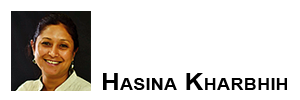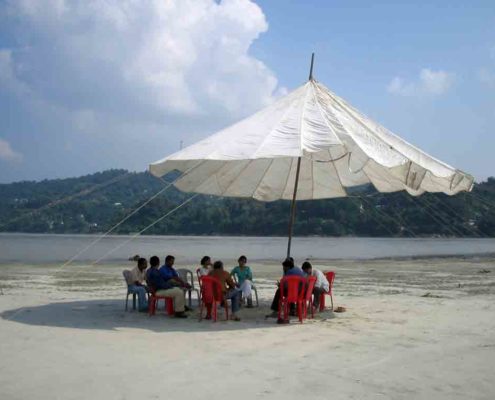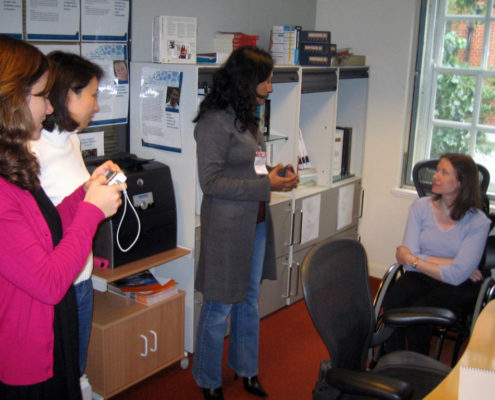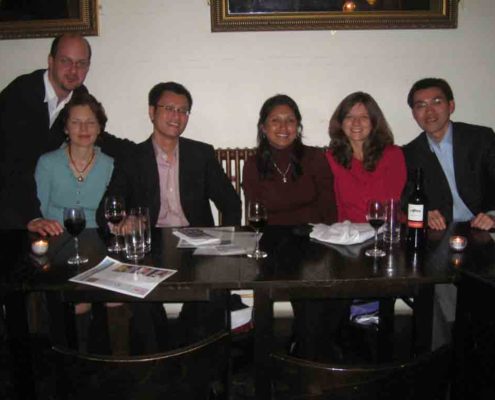Becoming & Being: An Ashoka Fellow
When I look back to my journey as an Ashoka Fellow, I recall the 15 years before it, when I had so deeply been involved in social entrepreneurship and the learning, experience and understanding that came with it. I was working towards the upliftment of the rural artisans of Syntein Village, East Khasi Hills District, Meghalaya.
I was planning and adopting strategies, building design skills and capacity support, and marketing linkages in bringing about changes for their economic livelihood. I was involving young people in community education, adolescent health and life-skill education, communication skills and introducing new dimensions for their participation to make them realize that they can be change-makers. These years gave me a clearer vision and meaning of being a social entrepreneur.
The Ashoka Fellowship further widened this outlook and helped me reflect upon the steps I had taken in my own capacity building, focussing on inner strengths and weaknesses. It helped me devise a clear concept in moulding Impulse NGO Network into gaining maturity and systematic functioning. My determination was raised several-folds and I was ready to face challenges more boldly.
The beginning
The selection for the Ashoka Fellowship positioned my role as a social change-maker more strongly, when Devashri Mukherjee, Director, Youth Venture (Ashoka India) came to Shillong to analyse my strategies, innovation and to present me to the selection panel in June 2006. My innovation was the Impulse Model, earlier known as Meghalaya Model which sought to deal with human trafficking through a skilful delegation of work between the government and citizen groups, ensuring a formulaic execution that is replicable anywhere. The panel interview was in-depth and took into account the innovations and strategies, which have room to scale up, in order to bring about a larger change in the community.
In January 2007, I met the other Ashoka Fellows of Asia at the induction ceremony. As we shared our similar problems and challenges, our newfound togetherness kindled our inborn leadership qualities and our desire to take up the role of solving the world’s pressing problems. We learnt more about Ashoka, its support system and the linkages that can be built upon. I even had a chance to meet and interact with Bill Drayton, Founder of Ashoka Innovators for the Public, whose words shall always inspire me.
During this time, I also met Siddharth Barthakur, North East Representative, Ashoka (New Delhi), who has, down the years, helped me strive towards my goal with more focus. His visit to Impulse NGO Network and his help in a team-building exercise with the core team and staff was a wonderful effort towards realizing the value of social entrepreneurship.
The Ashoka experience has helped me streamline and steer my network and enabled me to channelize the expertise gained, into a wider and broader network.
A French opportunity
In June 2007, Women’s Forum France sent me an email, informing of my selection as one of its Rising Talents and that I had to fill up an application. Silvia Giovannoni, Ashoka Representative, London had nominated me for it. I was both surprised and grateful and wanted to meet her.
So when I was invited to go to France in October, I immediately informed her and Andres Falconer, Head of Ashoka UK, that I would like to visit their London office. Courtesy Silvia and Grace Kang (a Volunteer of Ashoka London), who helped in scheduling my networking meetings, I had a chance to meet amazing people who supported me, recognized the importance of my idea and encouraged me to keep going. Some of these people were:
Mr Paul Cheng, Charities Aid Foundation and his brother, Mark Cheng, Ambac Assurance UK Limited
Both strong supporters of Ashoka Support Network Group, the brothers shared their views about my work and the prospect of exchanging resources.
David Phillips, Immigration Officer (Intelligence Section), UK Border Agency
His work with governments has given me a better insight on the issues of human trafficking and migration, apart from being an additional update in UK immigration procedures and new policy intervention.
Sue Gilbert, International Social Service of UK (ISS)
Sue shares a similar working principle as mine as ISS also helps in locating and repatriating trafficked girls to their homes.
Glynn Rankin, Head of Legal Services, UK Human Trafficking Centre (UKHTC)
Glynn gave me some remarkable ideas about strengthening Impulse’s NGO Network knowledge base for trafficking in person across the world and devising foolproof measures.
William Edmunson, BBC World Service Trust
I met him when the British Broadcasting Service (BBC) contacted me for a live interview that gave me the opportunity to share my ideas with a global audience.
Jacqueline (Jacqui) Hunt, Director, Equality Now
Meeting Jacqui was an opportunity to exchange methods and understand – the policy level that covers issues over exploiting women and children and the part played by 19 NGOs from different countries of the world involved in United Nations Global Initiative to Fight Human Trafficking (UNGIFT).
Farrah Bokhari, Information Officer, End Child Prostitution in Asian Tourism (ECPAT)
Farrah threw light on ECPAT’s ongoing programme of research, training and advocacy that has been able to raise the government’s awareness of the plight of children trafficked into the UK and about campaigning efforts.
Alexander Chiadi House of National Society for the Prevention of Cruelty to Children (NSPCC), London
Alexander told me about NSPCC’s launch of the first Advice and Information Line to protect children trafficked to the UK, for sexual exploitation, forced labour, drugs transport, benefit fraud and other crimes. I realised that though its work has similarities with Childline India Programme and Impulse NGO Network, NSPCC’s methodology was definitely worth imbibing.
Bex Keer, Campaign Coordinator, Stop the Traffik
Meeting Bex linked me up with other funding agencies, besides strengthening Impulse’s NGO Network work with OASIS India in common projects developed by Ashley Varghese; something that could strengthen the Impulse Model.
Aarti Kapoor, Policy Advisor, Child Exploitation and Online Protection Centre (CEOP)
Aarti recommended my name to be part of the CEOP in the International Advisory Congress of July 2008 where I had the opportunity of taking along two youths Emarine Kharbhih and Husnara Kharbhih (among 150 world youth representatives) representing India and Asia.



